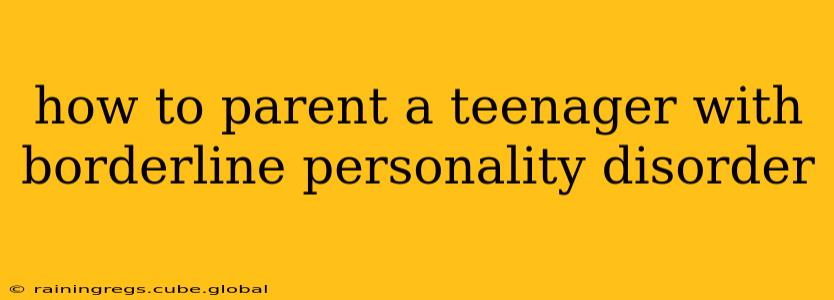How to Parent a Teenager with Borderline Personality Disorder (BPD)
Parenting a teenager is challenging under the best of circumstances. Adding a diagnosis of Borderline Personality Disorder (BPD) significantly increases the complexity and demands on parents. Understanding BPD, its symptoms, and effective parenting strategies is crucial for both the teen's well-being and the family's stability. This guide offers practical advice and addresses common parental concerns.
Understanding Borderline Personality Disorder in Teenagers
BPD is a mental health condition characterized by intense emotional swings, unstable relationships, and a fear of abandonment. In teenagers, these symptoms can manifest in various ways, making it difficult to distinguish from typical adolescent behavior. However, BPD in teens is marked by a pattern of instability and distress significantly impacting their daily lives.
Key characteristics may include:
- Emotional dysregulation: Intense and rapid shifts in mood, from euphoria to despair, often triggered by seemingly minor events.
- Impulsive behavior: Engaging in risky behaviors like self-harm, substance abuse, or reckless driving without considering the consequences.
- Identity disturbance: Feeling uncertain about their sense of self, values, and goals.
- Unstable relationships: Intense and unstable relationships characterized by idealization and devaluation of others.
- Fear of abandonment: An intense fear of being alone or abandoned, leading to clingy or manipulative behaviors.
- Chronic feelings of emptiness: A persistent sense of hollowness and lack of meaning.
Important Note: This information is for general knowledge and should not be considered a substitute for professional medical advice. If you suspect your teenager has BPD, seek a diagnosis and treatment plan from a qualified mental health professional.
How Can I Help My Teenager with BPD?
This is a common question among parents. The most effective approach involves a multi-pronged strategy focusing on professional help, family support, and self-care for parents.
-
Seek professional help: This is paramount. A therapist specializing in BPD and adolescent mental health can provide a diagnosis, develop a tailored treatment plan, and offer valuable guidance to parents. Therapy options might include Dialectical Behavior Therapy (DBT), a highly effective treatment for BPD.
-
Create a supportive and validating environment: Teenagers with BPD often struggle with feeling understood and accepted. Creating a safe space where they feel comfortable expressing their emotions (even difficult ones) is crucial. Practice active listening, validate their feelings without necessarily condoning their behaviors, and offer unconditional love and support.
What are the common challenges of parenting a teenager with BPD?
Parenting a teen with BPD presents unique challenges:
-
Managing emotional outbursts: These can be intense and draining. Learn techniques for de-escalation, setting boundaries, and taking care of your own emotional well-being during these times.
-
Dealing with manipulative behavior: Teenagers with BPD may use manipulative tactics to get their needs met. Learning to recognize these behaviors and setting firm, consistent boundaries is essential.
-
Balancing support and structure: It's important to provide both unconditional love and support while also setting clear expectations and consequences for unhealthy behaviors.
-
Coping with self-harm: If your teenager engages in self-harm, immediate professional help is crucial. Work with their therapist to develop safety plans and coping mechanisms.
What are some effective communication strategies for parents of teenagers with BPD?
Effective communication is key:
-
Practice active listening: Truly hear what your teen is saying, both verbally and nonverbally. Reflect back their feelings to show understanding.
-
Use "I" statements: Express your feelings and concerns without blaming or accusing. For example, instead of saying "You're always so dramatic," try "I feel overwhelmed when I see you react so intensely."
-
Avoid arguments: Arguments often escalate tensions. Focus on calmly stating your expectations and boundaries.
-
Seek family therapy: Family therapy can help improve communication and dynamics within the family.
How can I support myself while parenting a teenager with BPD?
Self-care is not selfish; it's essential. Parents need support too.
-
Join a support group: Connecting with other parents facing similar challenges can provide invaluable support and understanding.
-
Seek individual therapy: A therapist can help you process your emotions, develop coping mechanisms, and learn strategies for managing the demands of parenting a teenager with BPD.
-
Prioritize self-care activities: Engage in activities that help you relax and recharge, such as exercise, meditation, or spending time with supportive friends.
Parenting a teenager with BPD is a marathon, not a sprint. It requires patience, understanding, and a commitment to seeking professional help. By focusing on support, effective communication, and self-care, parents can create a more positive and stable environment for their teen and their entire family. Remember, you are not alone.
